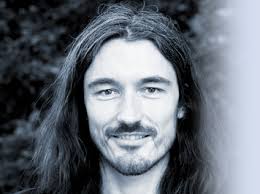 A number of our students went to hear a spiritual teacher last week on the topic of Intimate Relationships and Authentic Awakening. This mystic teacher hails from Vienna and is currently living with his wife in Tel Aviv. Thomas Hubl is his name and he is relatively young. Some of those who attended added up his pony tail, jeans, vest, monotone voice and smoldering eyes as the look of a charlatan. Others sang his praises proclaiming him as the “real deal.” Spirituality, it would appear, is also in the eye of the beholder.
A number of our students went to hear a spiritual teacher last week on the topic of Intimate Relationships and Authentic Awakening. This mystic teacher hails from Vienna and is currently living with his wife in Tel Aviv. Thomas Hubl is his name and he is relatively young. Some of those who attended added up his pony tail, jeans, vest, monotone voice and smoldering eyes as the look of a charlatan. Others sang his praises proclaiming him as the “real deal.” Spirituality, it would appear, is also in the eye of the beholder.
My take is what I take away from such an encounter and what I hear others having learned. Thomas Hubl has studied Kabbalah, and, although not quoting from it last week in Denver often quotes from and uses those teachings to convey his direct experience of the divine—that is what we call a mystic; a person who has a direct experience of the divine.
I take this quote, which is very similar to what he presented in his talk here, from Hubl’s long interview featured on his website (minor editing on my part to make it first person singular).
“In intimate (long term) relationships—the danger is that I can create a habit of my partner in my own awareness. What I then see when I relate to my partner is not my partner but the image of my partner in myself. This creates a problem because it freezes my partner and I don’t push the refresh button. The practice then is that the more awake I am the less I know people. Can I allow myself to get a fresh look of you in this moment, overcome my conditioned reality to see fresh? To see you right now. You right now…even if my mind knows you.”
The full interview is on the home page of http://www.thomashuebl.com/en/ under Buddha at the Gas Pump.
This teaching from Thomas Hubl is a well-known Kabbalah principle about relationships and about the nature of created reality. To be present is to be present to what is being born in the moment. The Kabbalistic understanding of, “Who is wise? The person who sees what is being born” differs from the traditional rabbinic interpretation. Instead of seeing this wisdom as anticipatory, “what will come in the future from present actions” (which is wisdom in itself) the Kabbalah offers that this wisdom is “seeing that something is emerging from nothing at all times.” This wisdom requires what Hubl calls pushing the refresh button.
What remains though as a question: “Can you really do this? And if you can, short of an insult to the brain event that wipes out your memory, how can you ever be non-habituated in a relationship or to any other aspect of reality?”
Hubl did not address the how (unless I missed it) except to say that it is not something to put off for tomorrow. He reiterated his point by saying that the more spiritually developed you are the less you know the other.
I would like to offer the following: Love is the ability to take risks. Whether we are talking about loving another or loving you it involves the willingness and ability to take risks. I am not suggesting taking risks that are foolish or destructive—the risks of love are facing loss, criticism, growth, giving, receiving, etc. If I have full love for myself then I can take risks—I can change small and big things (behaviors up to character traits) in myself. I then know it is possible for me and for others to continue to do this repeatedly.
So challenge yourself to love yourself enough and take the necessary risks to change. Then be open to or even ask those you are in relationships with to do the same. Start with something small—love yourself enough to make that change!









0 Comments